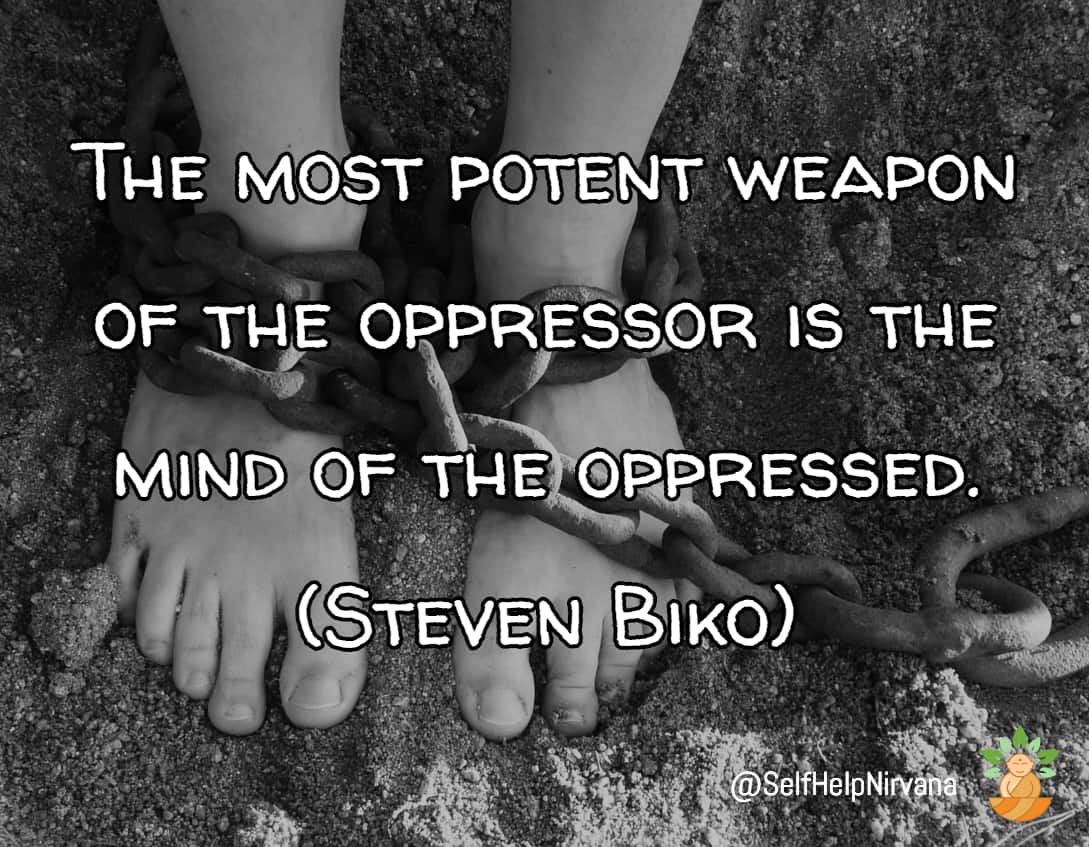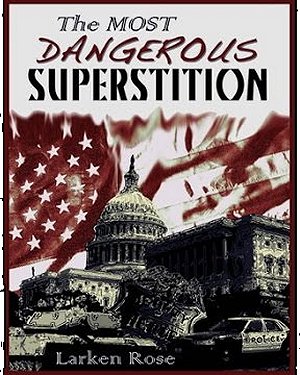My Thoughts On The Most Dangerous Superstition
My daily writing prompt yesterday was “What does the world need to know right now?” (see this article for more information about my writing prompts), which was timely because I’ve just finished reading The Most Dangerous Superstition by Larken Rose.
I’m not going to publish my entire answer to that prompt, because not all of it is relevant to my thoughts about this book, and also because what I wrote was for my personal journal, and not for public consumption.
But in a nutshell, my answer was based on this overall premise – that people need to know they are being manipulated, on almost every level imaginable.
If your initial reaction to that statement is that this is why you vote, then it’s probable you still don’t get what’s really going on.
Because as I have seen it for several decades now, the political parties are not the ones truly in control, even though that’s what they want you to think.
No, behind the scenes are a group of people, commonly referred to as “the elite”, who are pulling the strings.
Many of the people in that group are members of dynasties that go back centuries, and it would appear they have always had a long-term plan to achieve whatever their goals are – control of regular folks such as you and me.
As an aside, if you’ve never heard of the Georgia Guidestones, I suggest you check them out, because one of the ten inscriptions, or guidelines, states, “Maintain humanity under 500,000,000 in perpetual balance with nature.“
Since the world’s population is edging closer and closer to eight billion people, that means there has to be a lot culling going on to achieve that goal.
If all of this sounds too “tin foil hat”, then that is just evidence, to me and countless others, that the elites’ plan is working.
And I actually have a big problem with the word “elite”, when used in that context, and here’s why.
I do accept that at least one definition of “elite” includes mention of those who are super-rich, but what I don’t like about the word is the implication that these people are somehow better, or more qualified, to make decisions that affect millions, or even billions, of people.
Let’s not forget that many of these people inherited their wealth, so they are not necessarily experts on very much, if anything.
And you can see that all over the news right now, as I’m writing this in the middle of the coronavirus scare – Bill Gates is being quoted about “society must do this…” and other such statements, often regarding vaccines and GMOs and microchipping and tracking and tracing, and yet he has no medical training.
Contrast this with actual, qualified doctors who are being censored for speaking out against the official coronavirus narrative, and you might begin to see that all is not as they want you to believe.
Anyway, I’ll leave that there, because I could write about this all day.
The point is, it’s people’s perception that these “elites” somehow have some right to make these decisions. (And note that I do not include most of the visible politicians in this group of so-called elites.)
And that gets to the main thrust of the book I’m talking about here – authority.
Larken Rose writes at great length about what authority is, what it isn’t, and what people’s perception of it is, and why this causes problems.
(It’s worth noting that he’s talking about authority in the context of people who have power over you, not people who are recognized experts in their field.)
If there were a scale, from zero, where you believe all of the official narrative on all subjects, to ten, where you don’t believe any of it, then I would have graded myself at somewhere around five, maybe higher, before I read the book.
As I mentioned above, I stopped seeing the point of voting decades ago, because it became clear that somebody else was pulling their strings, and I have done a ton of reading on a variety of other topics that, to me at least, provide good reason to question what we are being told.
Remember too that the burden of proof lies with those making a claim, regardless of the claim in question. It therefore applies, for example, to the claim by theists that one or more gods exist, to the claim that vaccines are safe and fully tested, and, more relevantly here, to the claim that a government (or authority) is necessary for the safety and protection of the people.
(The book makes mention of a case known as DeShaney v. Winnebago, 489 U.S. 189, where the Supreme Court officially declared that “government” has no actual duty to protect the public, which may not be the way you thought it worked.)
But this book takes it much further than I had ever thought about before.
And, quite frankly, it paints a very dim picture of humans as a whole these days.
It’s probably been that way for centuries, in most of the world, at least.
Maybe, back in the days when humans lived in small groups, of no more than 200 or so, it was different. Maybe they all had to work together, as a true cooperative, to ensure their survival – although, of course, they may still have had a tribal chief ruling over them.
But that situation is definitely no longer the case.
Just look at the myriad of ever-increasing rules, the growing list of things you cannot do, sometimes at all, and sometimes without “permission”.
And in general, people seem afraid or unwilling or unable to make decisions for themselves or accept any responsibility for their actions – they are always looking to “authority” figures to tell them what to do (and what not to do).
The fact is, people will do almost anything provided that somebody who is perceived as an authority figure tells them to do it, and perhaps one of the most notable demonstrations of that was the experiment conducted by Dr Stanley Milgram in the 1960s.
In that experiment, people were persuaded to give others increasingly large shocks, with the vast majority of participants going all the way, as it were.
You can read a summary of this experiment here, although a more detailed account is available in a book written by Dr Stanley Milgram himself, which is called Obedience To Authority.
So, while the book does go on at great length about why authority, as perceived by most people, is just a myth, or superstition, and the harm this causes, the final chapter does talk about what a world without authority might look like.
At one level, I find his arguments somewhat naïf, but I also realize that may be 60+ years of programming showing through.
If you think back on your life, you will realize that the main education you receive is about how to obey your “superiors” (i.e. authority figures), and that obedience is good (regardless of whether what you are being told to do is right or wrong, from a moral and ethical perspective).
But on a deeper level, as difficult as it will be for most people (including myself) to accept that a life without mythical authority figures could well work.
Conclusion
I have deliberately not gone into too much detail about the contents of the book, mainly because I do not think I could do it justice – Larken has clearly lived and breathed this stuff for a long time and he makes a compelling case for why people’s belief and trust in authority is misplaced, and why we should create a world without authority.
How much you enjoy this book will, I think, depend entirely on how much you trust the official narrative and how open-minded you are to having your comfort blanket ripped away.
For me, it was not a large leap to see what I perceive as the truth in what Larken says, but for others, it may trigger a major bout of cognitive dissonance, because it calls into question almost everything about how modern society works (or doesn’t work, depending on how you look at it, of course) and your entire life.
Regardless, I found this book to be thought-provoking (in a good way), and I would highly recommend you read it while it’s still available.
I’ll close with this quote by Steven Biko, a South African anti-apartheid activist, because it goes straight to the heart of what is happening and why the people who are granted the power of control over you do what they do without any real backlack:

Additional Resources
These are suggestions for those who wish to delve deeper into any of the above:







